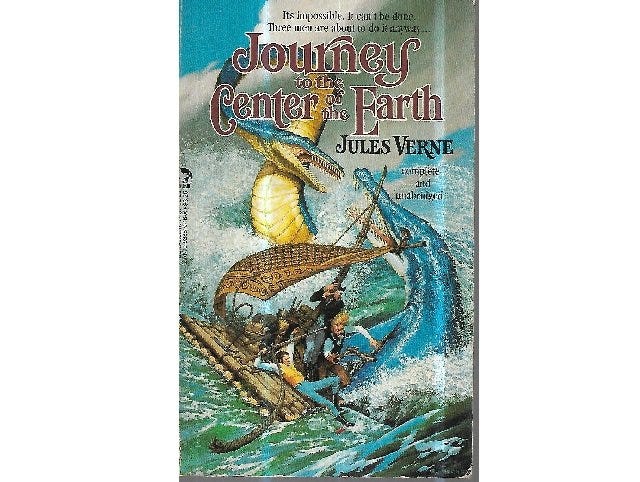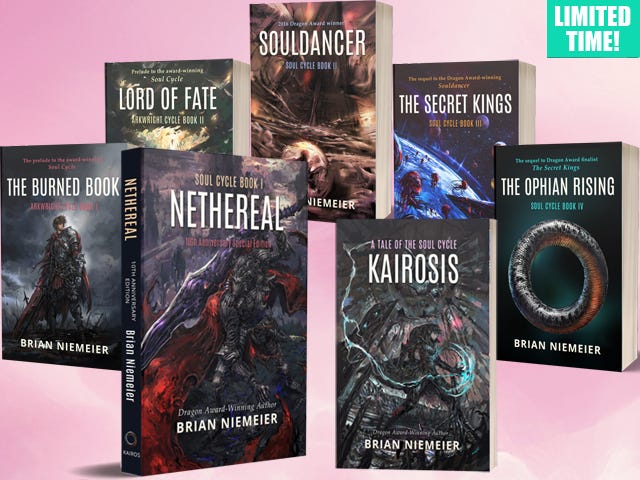Update: The crowdfunding campaign for the 10th Anniversary Special Edition of my first novel Nethereal has reached its initial goal! Claim exclusive rewards and limited editions while helping us fund our exciting stretch goals. Back the Kickstarter now!
It’s one of those truths that everyone suspects but few dare say aloud: The terms “science fiction” and “fantasy” are dead.
Not just dead in any quaint, nostalgic sense, but utterly irrelevant, useless, and unfit for purpose.
Worse still, they were never meant to be anything other than inventory tags for publishers and booksellers—crude labels slapped onto bookshelves and warehouse bins, designed to corral products; not communicate literary content or reader tastes.
If you want to understand why it’s time to stop pretending these labels matter—and why clinging to them has done irreparable damage to readers, writers, and the art of storytelling—then buckle in. We’re going to take a hard look at how these terms were born, how they were corrupted, and why the age of these arbitrary divisions is over.
Big shout out to author JD Cowan who did the hard work hitting the books on this topic.
Let’s clear a major misconception out of the way first: “Science fiction” and “fantasy” were never designed to help readers figure out what to read. Instead, they were marketing tools for booksellers to organize and track their inventories. These labels were invented to separate stacks of pulp paperbacks by superficial characteristics: spaceships or dragons. That way, clerks could restock shelves faster, and warehouses could count inventory efficiently.
Look at the history. When Hugo Gernsback launched Amazing Stories in 1926, the modern science fiction magazine was born. It wasn’t because of some lofty literary ideal. Gernsback saw a niche to fill: affordable magazines with colorful covers promising adventure and wonder for an American audience hungry for escape in a turbulent world.
Gernsback owed his success to timing and market savvy. He gave a satisfying product to an audience who simply wanted thrilling stories.
As one critic once put it, Amazing Stories succeeded because it offered a simplified future to an audience “ignorant about science, politics, and sociology.”
That wasn’t a compliment. It was a tacit admission that these labels catered to a less intellectual crowd: those who bought magazines rather than plowed through “sophisticated” European books. These readers didn’t want to be alienated by tedious existentialist or nihilistic pessimism masquerading as art.
Related: Why Materialism Holds Back the Right’s Next Great Storytellers
Yet even as Gernsback’s pulps brought mass-market appeal, later gatekeepers looked upon his success with disdain. They dismissed the audience as simpletons and began reshaping the genre into an elitist, insular ghetto where bitter intellectuals debated the “correct” way to write stories, leaving behind the same readers who made the medium viable.
That insularity was no accident. Fandom, the self-appointed magisterium of sci fi and fantasy enthusiasts, arose not to celebrate storytelling but to control it. They weaponized genre labels to erect barriers, pushing out anyone who didn’t conform to their ideological and aesthetic standards. Over time, “science fiction” and “fantasy” became not just labels on store shelves, but fences keeping out undesirables—those who liked hopeful stories, heroism, or simple escapism.
Consider this ironic turn of fate: The same gatekeepers who now decry the pulps and their populist appeal are descended from the fans who grew out of Gernsback’s creation. These fans thought themselves intellectually superior to the masses and sought to remake the genre in their own image. The self-proclaimed elite viewed readers not as customers but as pests to be controlled or ignored. They excommunicated authors who dared write with optimism or heart and elevated tales of loneliness, alienation, and transcendence that smothered any humanity.
One striking example of this phenomenon is the veneration of Childhood’s End by Arthur C. Clarke, a story about humanity’s destruction and transcendence into amoral, void-floating beings. It epitomizes the anti-human, Gnostic nihilism that pervaded much of late twentieth-century speculative fiction: a grim rejection of hope and heroism in favor of cold, materialistic transcendence. This is the worldview fandom has championed, not because it reflects the real hopes and dreams of readers, but because it mirrors their bitter, alienated mindset.
The tragic result of fandom’s cultural coup is a genre that no longer speaks to the majority of readers. The wider world still craves heroes, stories of courage, and a sense that the future can be better. Meanwhile, speculative fiction has become a bubble populated by spiteful insiders swapping cynical, self-referential tales that no longer resonate with anyone outside their echo chamber.
The split is palpable. On one side, the gatekeepers debate ratios of skin tones, genders, and politics. On the other, vast audiences enjoy movies, novels, and video games that owe far more to the pulps than to the dreary, cerebral essays beloved by fandom. These stories transcend the increasingly irrelevant categories of “science fiction” and “fantasy” because they speak a universal language …
Story.
But if readers have moved on, publishers and booksellers have not. For them, “science fiction” and “fantasy” remain convenient marketing pigeonholes. It’s easier to print up shelf labels and file books accordingly than to describe stories by tone, theme, or emotional impact; never mind that those categories matter far more to readers.
Why? Because these labels serve the old guard’s business interests. They help segment the market, drive brand evangelism, and push merchandise on loyal customers who will blindly buy what is branded correctly. As you can see, it’s not about storytelling; it’s about control, profit, and convenience.
Related: The Penguin in the Coal Mine
But the old labels are failing oldpub. Readers increasingly reject narrow definitions and flock to stories that defy genre. Newpub has exploded because the gatekeepers no longer hold a monopoly on storytelling. Writers and readers alike reject the old strictures, and that rejection has been vindicated.
Yet this exposé of oldpub cynicism raises a pressing question: What would a world without genre labels look like?
Imagine a bookstore or a digital storefront where stories aren’t boxed into Science Fiction or Fantasy, but are presented by theme, setting, and the emotional experiences readers are seeking. You want hopeful adventure? Here’s a shelf. You want dark and introspective? Right over there. Love stories, political thrillers, or epic tales of redemption are all sorted by reader desires, not arbitrary tropes.
This approach would liberate authors to write what they want without fear of being locked out of a genre because their work doesn’t conform to some gatekeeper’s narrow vision. And it would allow readers to find what truly excites them, instead of being funneled into content-free labels.
Most importantly, these more honest categories would restore storytelling to what it has always been: a celebration of the human experience, not a battleground for ideological gatekeepers.
The “science fiction” and “fantasy” pigeonholes never helped readers. They were marketing tools from the start, not artistic categories. Then fandom turned them into filters, pushing out hope, optimism, and humanity in favor of basic nihilism and ideological preening.
The rest of the world moved on long ago, chasing stories that resonate beyond the confines of genre. Publishers and booksellers cling to these dead labels because they’re comfortable and profitable, but the writing is on the wall.
It’s time to kill the labels.
Stop asking if a story is science fiction or fantasy. Instead, ask: Does it inspire? Does it entertain? Does it speak to the human spirit?
When we finally stop worshiping empty genre names and start celebrating stories themselves, speculative fiction can finally grow up, break free of its ghetto, and reclaim its rightful place at the heart of culture.
If you want to reclaim the joy of storytelling and see speculative fiction flourish again, it’s time to stop bowing down to labels and start standing in awe of stories.
The Nethereal 10th Anniversary Special Edition and the brand-new Kairosis novella have been funded! And there’s no better way to help make this triumphant campaign even more epic than by claiming our biggest, boldest, and most limited reward yet:
The July 4th Package – Only Available Through Independence Day Weekend!
Get the Nethereal Special Edition and Kairosis novella hardcovers, plus every other Soul Cycle book and both Arkwright Cycle books in paperback—along with a personalized author note on a custom label—all for just $199!
Don’t miss out! Claim the July 4th Package before it’s gone!









This is a great piece! Thanks for the hard work. I love the idea of new categories, organizing books by themes instead of old tags. I do find myself loving the old tags though. SFF and even 'speculative fiction', but maybe that's because I love speculative philosophy and that term 'speculative' means something to me that it may not mean to others. It's hard to imagine being a book seller and totally doing away with the SF tag though. SF seems like shorthand that can tell the reader at least a little of what to expect without having to give too much of the plot away. Maybe I'm just too enamored of the old categories though.
I once had a back and forth on reddit (which was my first mistake) about a completely fantastic story that had an excess of magical spells that happened to take the form of spaceships and a lot of gee-whiz about computers and virtual reality.
The redditors insisted that this was "more realistic" and more scientifically accurate because the author had a PhD or some such. (I know, I'm also stunned that redditors would behave this way.)
It was totally lost on them that fantasizing about the latest scientific finding isn't much different from fantasizing about the myths you read as a kid. Imaginative stories are imaginative stories, as far as I see it.
This is a long overdue correction.